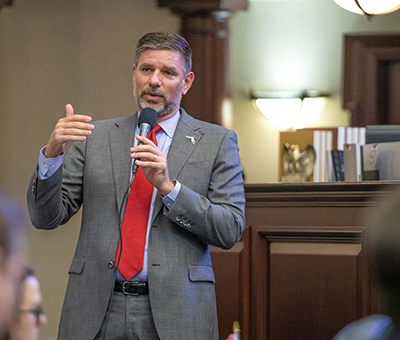
What comes next will be important with the controversial new homeless law, our Capitol Columnist writes.
The French author Anatole France wrote, “The law, in its majestic equality, forbids rich and poor alike to sleep under bridges, to beg in the streets, and to steal their bread.”
The oft-quoted 19th-century skeptic might have smiled ruefully at a news conference Gov Ron DeSantis held last week to sign a law intended to drive homeless people out of urban areas.
Come Oct. 1, cities and counties may no longer allow homeless people to pitch tents on sidewalks or make a lean-to in public parks to spend the night; rather, they will be directed to shelters or designated camping fields, supposedly safe from drugs and crime.
Well, make that “safer” — it’s got to be better than life, literally, in the gutter.
The idea behind the legislation is not just to move homeless people, but to steer them to drug treatment, mental-health counseling, or other programs to return their lives to some normality.
The new law also says citizens whose homes or businesses are blighted by these modern-day Hoovervilles will be able to sue local governments to force a clean-up. The state is expected to provide $10 million for local governments to comply.
Predictably, the legislative debate on HB 1365 showed stark liberal-conservative differences in Tallahassee between the vocal minority of liberal Democrats and the steamroller tendencies of controlling Republicans. DeSantis and his GOP allies emphasized helping people with drug treatment and mental health counseling, while opponents said the bill could drive people into jails.
Rep. Anna Eskamani, D-Orlando, one of the foremost advocates for poor people in the House, said the law “creates a scenario for local governments, where the only option if they can’t meet the demands of the Legislature, is to potentially criminalize the homeless.”
The trouble with legislating human behavior is that government often works along orderly, logical, statistical lines to solve problems that are disorderly, illogical, and not conforming to statistical norms. Drinking and driving is illogical, and every Floridian understands that at 3 p.m. — but later, after four or five drinks, getting behind the wheel doesn’t seem so stupid, no matter how legislators try to deter it.
Gambling, punching somebody, quitting school, theft — all are dumb, potentially harmful things that the government warns against, but people keep doing. So how can a well-thought-out state plan reach people who wake up every day thinking about finding the money to get high?
Still, Rep. Sam Garrison, R-Fleming Island, said the state must try. Doing something sure beats doing nothing, he said.
“This is not a perfect bill. It will not eliminate homelessness, but it is a start,” Garrison, who chairs the House health-care budget panel, wrote in an essay coinciding with DeSantis signing the law. “And it states clearly that in Florida, the status quo is not an option.”
Garrison and Eskamani are both right. Parents taking their kids to a movie or shopping downtown shouldn’t have to step over passed-out addicts on the sidewalk. Merchants deserve to have their doorways cleared of pilfered shopping carts holding the worldly possessions of some guy snoring in their shop door.
But a family living in a tent gets no help from being told to go somewhere else, nor does the drunk sleeping on a bus bench.
As Garrison said, it’s a start. Leaving people on the streets isn’t accomplishing anything. What will matter is how the state and local governments follow up.
They know $10 million isn’t enough. Garrison is in line to take over as speaker of the House in the 2026-2028 term, so he’s just coming into his prime as a powerful decision-maker for the next few sessions.
Whether this new law is just a get-tough gesture, or the “first step” Garrison spoke of, will depend on what legislators do next.
Bill Cotterell is a retired capitol reporter for United Press International and the Tallahassee Democrat. He can be reached at bcotterell@govexec.com


Be the first to comment